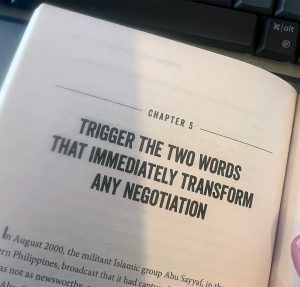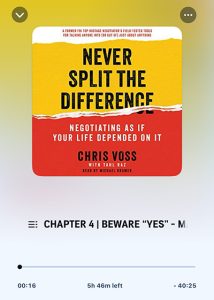It is exceedingly rare that you are given something you do not ask for, be it a date, a promotion, or a higher salary. You must ask for it; otherwise, you are unlikely to get it. But how do you ask for it? And what happens when you need to negotiate the terms? And what about when you wish to buy or sell something? You need to negotiate the terms.
Life is negotiation, “they” say. And if you think about it, they are right. But what if you could read a book that would make you a better negotiator? Doesn’t that mean you would have an advantage in life?
Introduction
Never Split the Difference is a book written by former FBI Hostage Negotiator Chris Voss and Journalist Tahl Raz. During his career at the FBI, the Author, Chris Voss, was involved in many hostage negotiations and was the lead International Kidnapping Negotiator. He discovered that many techniques he employed during his years at the FBI are applicable in everyday situations and worked not only on murderers and kidnappers but on everyone.
After retiring from the FBI, he founded The Black Swan Group, which teaches businesses negotiation skills.
In this book, he combines real-life stories from those negotiations with practical advice and techniques to make us better negotiators.

Key lessons
Here’s a short preview of some of the lessons you will find in this book. If you decide to read it, you will find out how to implement them.
No is the beginning, not the end.
This is not meant only in a “they didn’t say YES, so we now have to negotiate” way; it is a technique to start the negotiation or even a sales pitch. In the Author’s experience, the most used method to get them to say yes is dead wrong.
For me, this was the biggest lesson I took from this book, as it just clicked with me—precisely because it flies in the face of the established, conventional “wisdom”—that getting to yes should be the goal at all costs. Yet the Author is right—we intuitively feel when we are being herded towards a yes, and all we wish to say is no to stop feeling manipulated. Instead, we should try to get our counterpart to say no and make them feel in control.
Mirroring
This one is a more traditional technique, but it is good to have a former FBI Hostage Negotiator validate its usefulness as well. You know the theory—we love what is similar and fear what is different. So, by mirroring your counterpart’s body language, speech patterns and intonation, you establish rapport and make them trust you,
Tactical Empathy & Labels
Emotions are not to be ignored in a negotiation; instead, they should be harnessed. By having empathy and listening, you will understand the problems your counterpart has. After you know their feelings, you can say them aloud—repeat their emotions back to them.
That shows them that you understand how they are feeling. This brings people closer. This makes them responsive.
Review
There are, of course, many other techniques, tips, and tricks for negotiating & bargaining, along with a tutorial on how to bring it all together so everything is more effective. But how is everything written and put together, and is it easy to understand?
I love how the book is structured and written, as each Chapter introduces a new technique and often builds on the one from the previous Chapter. Chapters, in principle, start with a real-life negotiation story — sometimes a bank robbery, sometimes a kidnapping, sometimes a business negotiation —and then transition from that situation into a description of the techniques used and how to apply them.
I am not a neuroscientist, and I am not exactly sure which writing style helps us remember the most content, but from a subjective perspective, I enjoyed this style. And I feel that potential benefits – like staying focused and motivated to read the book (because of the stories which keep you interested) – outweigh any possible issues with this style – like selective memory of only the “fun” stuff. I feel that even the techniques and the things you should remember are explained simply enough not to feel tiresome.
And, if you are really interested in something, you should be taking notes anyway. I think you will feel motivated to do so here.
Even if you are not interested in negotiating for yourself but are simply curious about how is it done in the FBI or in high-stakes business scenarios, even then you should read this book, if for no other reason, then to learn something in general or even to have fun, as the stories the book contains are actually terrific and almost a good reason, of itself, to read this book.
Just another word about the fact that a lot of people say that these sorts of tactics feel like manipulation. Sure, I can see why you feel that way at first, but the truth is—you do not want to be taken advantage of. You do want to be prepared for what life presents you with. And this book is not sleazy—it does not attempt to teach you to humiliate your opponent, but rather to solve the situation.
I do think that hostage negotiation is a good analogy to what the book does. The hostage negotiator’s job is not to keep the bad guys talking until the hostages can be freed by force, but it is to solve the situation with no loss of life. Just as a hostage negotiator attempts to solve the problem, so should you —in business and in private life. This is the negotiation style the book teaches, and to me, there’s nothing sleazy about that.
Audiobook

I did find the book worth getting the Audiobook as well. This way I could listen to it while working out or walking through nature, for example.
I do like the Audiobook a lot, especially for a book of this type. I found it cute, yet helpful that the speaker used the same tone of voice the Author was writing about. So, for example, when the book talks about using upward or downward intonation, the speaker would switch to that intonation to demonstrate. I loved the “Late Night FM DJ Voice”.
I am not sure the Audiobook would be enough on its own, though, as I often do other things while listening to books. But if you can concentrate only on listening and have an Audible membership anyway, for example, it’s certainly worth one credit. If it is either-or for you—either the real book or the audio book — I leave the decision to you; you should know yourself well enough to decide whether you can learn from audio books.
But if the question is whether you should give this book any time at all, my answer is yes —you should definitely read it, or at least listen to it.

Everyone loves what you guys tend to be up too.
This type of clever work and coverage! Keep up the amazing works guys I’ve
you guys to my personal blogroll.